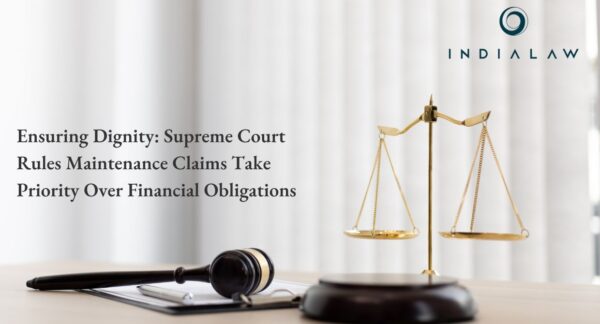Adjudicating Authority cannot delve into the merits of a Section 95 of Company Petition before appointment of Resolution Professional under Section 97 of IBC


The Hon’ble National Company Law Appellate Tribunal, Principal Bench, New Delhi, comprising of Justice Ashok Bhushan (Chairperson), Barun Mitra (Technical Member), and Arun Baroka (Technical Member), in Central Bank of India vs. Deepen Arun Parekh vide its Order dated 11th November, 2024, while setting aside the Order dated 21.02.2024 of the Adjudicating Authority held that the Adjudicating Authority is not empowered to exercise its adjudicatory power at the stage of considering a Company Petition under Section 95 of the Insolvency and Bankruptcy Code by delving into the merits of the case. The role of the Adjudicating Authority at this stage is limited to appointing a Resolution Professional and the adjudicatory power is triggered when the Resolution Professional submits a report under Section 99 of the Insolvency and Bankruptcy Code, recommending whether the application should be admitted or rejected.
Table of Contents
Facts of the Case
This Appeal has been preferred by the Financial Creditor, Central Bank of India against the Order dated 21.02.2024 passed by the Hon’ble National Company Law Tribunal, Mumbai, whereby the Adjudicating Authority (hereinafter referred to as “AA”) has allowed the IA No. 5501 of 2023 in CP(IB)/420 (MB)2022, filed by the Personal Guarantor, dismissing the Section 95 of Insolvency and Bankruptcy Code, 2016 (hereinafter referred to as “IBC”) Company Petition filed by the Financial Creditor even before appointment of the Resolution Professional (hereinafter referred to as “RP”).
M/s. Parekh Aluminex Ltd (hereinafter referred to as “Corporate Debtor”) had availed various credit facilities from the Financial Creditor and as the Corporate Debtor defaulted a Corporate Debt Restructure (hereinafter referred to as “CDR”) was approved on 30.09.2013 for the credit facilities of the Corporate Debtor and subsequently a Master Restructuring Agreement was executed. Pursuant to which the Personal Guarantor executed a Deed of Guarantee dated 10.04.2014 and guaranteed the repayment of the credit facility availed by the Corporate Debtor from the Financial Creditor. Thereafter, upon default in repayment of the loan amount, the loan account of the Corporate Debtor was classified as NPA on 31.12.2015.
The Financial Creditor called upon the Corporate Debtor and the Personal Guarantor to repay the loan vide a notice dated 18.05.2016, under Section 13(2) under the SARFAESI Act, 2002. Further, a Demand Notice in Form-B was issued to the Personal Guarantor on 18.12.2020 calling upon him to pay a sum of Rs. 354,09,04,055/-.
Consequently, a Section 95 of IBC Company Petition was filed by the Financial Creditor on 14.12.2021 against the Personal Guarantor for financial debt of Rs.354,09,05,055/- as on 18.12.2020. The Personal Guarantor had filed an IA No. 5501 of 2023 praying for dismissal of the Company Petition raising various grounds, including that the Personal Guarantor was not the debtor or guarantor and that the Petition was barred by limitation and the same was allowed by the AA vide an impugned Order dated 21.02.2024.
Issue Involved
Whether the AA can delve on the merits of the case in a Company Petition filed under Section 95 of IBC even before the appointment of the RP under Section 97?
Contentions of the Parties
Financial Creditor (Central Bank of India)
The Financial Creditor submitted that AA had erred in adjudicating the issued raised by the Personal Guarantors and delving into the merits of the Company Petition as the same was not at the stage of adjudication. As per IBC, when a Company Petition under Section 95 is filed by the Financial Creditor, the AA is required to appoint a RP under Section 97 of IBC and that without appointing the RP and without giving the opportunity to the RP to submit a Report as contemplated under Section 99 of the IBC, the AA ought not to have proceeded to adjudicate various issues raised by the Personal Guarantor.
The Financial Creditor relied on the judgement of the Hon’ble Supreme Court in Dilip B. Jiwrajka vs. Union of India (hereinafter referred to as Dilip B. Jiwrajka”) and submitted that the case has laid down that, the adjudicatory issues in Section 95 Company Petition had to be undertaken by the AA only at the stage of hearing of the application of Section 100 of IBC. The Financial Creditor submitted that the AA erred in rejecting the Section 95 of IBC Company Petition as the same is contrary to the law laid down by the Hon’ble Supreme Court in Dilip B. Jiwrajka’s case.
Personal Guarantor (Deepen Arun Parekh)
The Personal Guarantor submitted that the Financial Creditor did not raise any objection regarding the jurisdiction of the AA in the reply filed by them. In the light of the same the Financial Creditor has waived their right to raise any objection on basis of the Dilip B. Jiwrajka’s case.
The Personal Guarantor further submitted that the Deed of Guarantee never came into force as the guarantee provided was conditional/contingent in nature and could have only become effective when CDR package was sanctioned and implemented in full.
Analysis/ Findings of National Company Law Appellant Tribunal
The Hon’ble NCLAT while allowing the Appeal file by the Financial Creditor set aside the Order of the AA and held that AA erred in law by delving into the objections raised by the Personal Guarantor on the merits of the Section 95 Company Petition filed by the Financial Creditor at a stage when the RP was not even appointed. The Hon’ble NCLAT further clarified, that considering the scheme laid down by the IBC and the law laid down in Dilip B. Jiwrajka’s case, that the AA ought to have delved into the merits of the case only at the time of hearing the Section 95 Company Petition under Section 100 of IBC.
The Hon’ble NCLAT while setting aside the Order dated 21.02.2024 passed by the AA referred to (i) Ravi Ajit Kulkarni vs. State Bank of India where it was held that “before the stage of appointment of the RP, the Code or Rules and Regulations, do not provide for any hearing as such to be given to the Debtor”, (ii) Babu Varghese & Ors. vs. Bar Council of Kerala & Ors. where the Hon’ble Supreme Court ruled that if a specific procedure for carrying out an act is outlined in a law, the act must be performed in that prescribed manner, or not be done at all, (iii) State of Uttar Pradesh vs. Singhara Singh & Ors., where the Court has recognised the rule adopted in Taylor v. Taylor [(1875) 1 Ch D 426, 431] and the effect of the same is that when a law grants the authority to perform an act and specifies the method to be followed, it effectively prevents the act from being carried out in any other way. The reasoning behind this principle is that if the act could be done differently, the statutory provision would serve no purpose and (iv) Tata Chemicals Ltd. vs. Commissioner of Customs (Preventive) Jamnagar, where the Hon’ble Supreme Court has laid down that “there can be no estoppel against law, if the law requires that something be done in a particular manner”.
Conclusion
The Hon’ble NCLAT while referring the land mark judgement of Dilip B. Jiwrajka has allowed the Appeal and reaffirmed the scheme of IBC and the procedure laid under the code. Further, the Hon’ble NCLAT held that adjudication of a Company Petition under Section 95 of IBC before the appointment of a RP is bad in law and should not be allowed.




